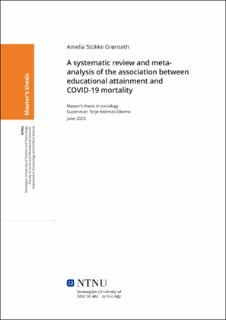A systematic review and meta-analysis of the association between educational attainment and COVID-19 mortality
Master thesis
Permanent lenke
https://hdl.handle.net/11250/3078747Utgivelsesdato
2023Metadata
Vis full innførselSamlinger
Sammendrag
Bakgrunn: Sammenhengen mellom utdanning og helse har blitt bekreftet opp gjennom årene. Derfor er det rimelig å anta at utdanningsnivå har hatt en innvirkning på helseutfall i forbindelse med COVID-19-pandemien. Ettersom spørsmålet om sosiale ulikheter i helse er av avgjørende betydning for beslutningstakere når fremtidig politikk for å utjevne forskjellene skal utformes, er det behov for å systematisk samle og syntetisere alle tilgjengelige studier om temaet. Som et svar på dette behovet har denne studien som mål å analysere sammenhengen mellom utdanningsnivå og COVID-19-dødelighet blant voksne i Europa.
Metode: Denne studien er en omfattende systematisk gjennomgang og metaanalyse som undersøker effekten av utdanningsnivå på dødeligheten av COVID-19 hos voksne i Europa. I juni 2022 ble det gjennomført et globalt litteratursøk i 7 ulike databaser. Sammendrag og fulltekster ble gjennomgått av et par forskere som arbeidet hver for seg, før eventuelle uoverensstemmelser ble avgjort. Effektestimater i form av odds ratio og hazard ratio ble hentet ut fra studiene for å undersøke sammenhengen mellom lavt og middels utdanningsnivå og COVID-19-dødelighet, med høyt utdanningsnivå som referansekategori. Random-effects metaanalyser ble utført ved hjelp av dataprogrammet RStudio, som er kompatibelt med programmeringsspråket R.
Resultat: Det systematiske litteratursøket identifiserte 15 859 artikler som ble gjennomgått for inklusjon i henhold til definerte kriterier. Totalt 8 artikler som oppfylte inklusjonskriteriene og inneholdt data på individnivå fra den europeiske regionen ble inkludert i denne kvalitative syntesen. Fem av disse var kvalifisert for metaanalyse. Resultatene fra metaanalysene viste en samlet odds ratio på 1.09 (95 % KI 1.03-1.16) for lavt utdanningsnivå og et estimat på 1.05 (95 % KI 1.01-1.10) for middels utdanningsnivå. De viste også en samlet hazard ratio på 1.36 (95 % KI 1.07-1.73) for lavt utdanningsnivå og et estimat på 1.29 (95 % KI 1.09-1.53) for middels utdanningsnivå. Utdanningsgradienten i COVID-19-dødelighet for både odds ratio og hazard ratio estimater visualiserte en trinnvis reduksjon i dødelighetsrisiko for hvert ekstra utdanningsnivå oppnådd.
Konklusjon: Resultatene fra denne studien bekrefter at utdanningsnivå er assosiert med COVID-19-dødelighet for voksne i Europa, og viser at personer med lavere utdanningsnivå har økt risiko for dødelighet sammenlignet med personer med høy utdanning. Disse funnene gir støtte til evidensbasert politikkutforming for å redusere ulikheter i helse på tvers av utdanningsgradienten og forbedre tilgangen til utdanning for alle. Background: The association between education and health has continuously been confirmed throughout the years. It is thus reasonable to assume that educational attainment has had an impact on health outcome facing the COVID-19 pandemic. As the issue of social inequalities in health is of vital importance for policymakers when deciding on future policies meant to improve disparities, a need exists to systematically gather and synthesize all studies available on the topic. As an answer to this need, this study aims to analyse the relationship between educational attainment and COVID-19 mortality for adults in Europe.
Methods: This study is a comprehensive systematic review and meta-analysis examining the effect of educational attainment on adult COVID-19 mortality in Europe. A global literature search was conducted in June 2022 across 7 different databases. Abstracts and full-texts were screened for eligibility by a pair of reviewers working separately before reconciling on any discrepancies. Effect estimates in odds ratio and hazard ratio were extracted from the studies, examining the relationship between low and medium educational attainment and COVID-19 mortality with high educational attainment as the reference category. Random-effects meta-analyses were conducted using the data program RStudio compatible with the programming language R.
Results: The systematic literature search identified 15 859 records reviewed for inclusion according to defined criteria. A total of 8 articles met the inclusion criteria containing individual-level data from the European region and were included in this qualitative synthesis. Five of these were eligible for meta-analyses. Results from the meta-analyses showed an overall odds ratio of 1.09 (95% CI 1.03-1.16) for low educational attainment and an estimate of 1.05 (95% CI 1.01-1.10) for medium educational attainment, whereas an overall hazard ratio of 1.36 (95% CI 1.07-1.73) for low educational attainment and an estimate of 1.29 (95% CI 1.09-1.53) for medium educational attainment. The educational gradient in COVID-19 mortality for both odds ratio and hazard ratio estimates visualized a stepwise decrease in mortality risk for each additional level of education achieved.
Conclusion: The results from this study confirm that educational attainment is associated with COVID-19 mortality for adults in Europe and shows that individuals with lower educational attainment have increased risk of mortality compared to those with high educational attainment. These findings provide support for evidence-based policymaking to reduce inequalities in health across the educational gradient and improve access to education for all.
